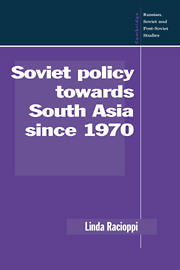Book contents
- Frontmatter
- Contents
- List of tables
- Acknowledgments
- 1 Introduction: South Asia in the USSR's Third World policy
- 2 Soviet perceptions of the Third World and South Asia
- 3 The Soviet Union in South Asia: objectives and instruments
- 4 Stability and change in Soviet–South Asian relations, 1970–1978
- 5 Soviet–South Asian relations in the wake of Afghanistan, 1978–1985
- 6 Soviet Policy towards South Asia in the Gorbachev era
- 7 Conclusion
- Notes
- Index
- Soviet and East European Studies
2 - Soviet perceptions of the Third World and South Asia
Published online by Cambridge University Press: 15 December 2009
- Frontmatter
- Contents
- List of tables
- Acknowledgments
- 1 Introduction: South Asia in the USSR's Third World policy
- 2 Soviet perceptions of the Third World and South Asia
- 3 The Soviet Union in South Asia: objectives and instruments
- 4 Stability and change in Soviet–South Asian relations, 1970–1978
- 5 Soviet–South Asian relations in the wake of Afghanistan, 1978–1985
- 6 Soviet Policy towards South Asia in the Gorbachev era
- 7 Conclusion
- Notes
- Index
- Soviet and East European Studies
Summary
Introduction
What was the evolution of Soviet thinking about international affairs and the Third World that led the USSR away from a view that the correlation of forces in the Third World was fortuitous for the development of socialism to a view that stressed not only the unreadiness of the Third World for a transition to socialism but also the commonality of interests regardless of path of development? How was it that under Gorbachev the USSR in part turned away from a Third World that figured so prominently in Brezhnev's foreign policy? This chapter attempts to trace the evolution of Soviet perceptions of the international environment, the Third World, and South Asia from the 1970s to the advent of the New Thinking in an effort to ascertain the commonalities and fundamentals in Soviet images of the Third World while pointing up changes in views over time.
It is beyond the scope of this work, of course, to provide a complete review of Soviet analyses of international relations and the Third World, and indeed, there have been already many fine scholarly works which have examined the Soviet scholarly literature and writings by policymakers. What this chapter hopes to accomplish in its limited way is an overview of the main currents in the Soviet literature since the 1970s which indicate the range of debate about international relations and the Third World and which then become an important component of the New Thinking and policies of the Gorbachev regime.
- Type
- Chapter
- Information
- Soviet Policy towards South Asia since 1970 , pp. 11 - 38Publisher: Cambridge University PressPrint publication year: 1994



